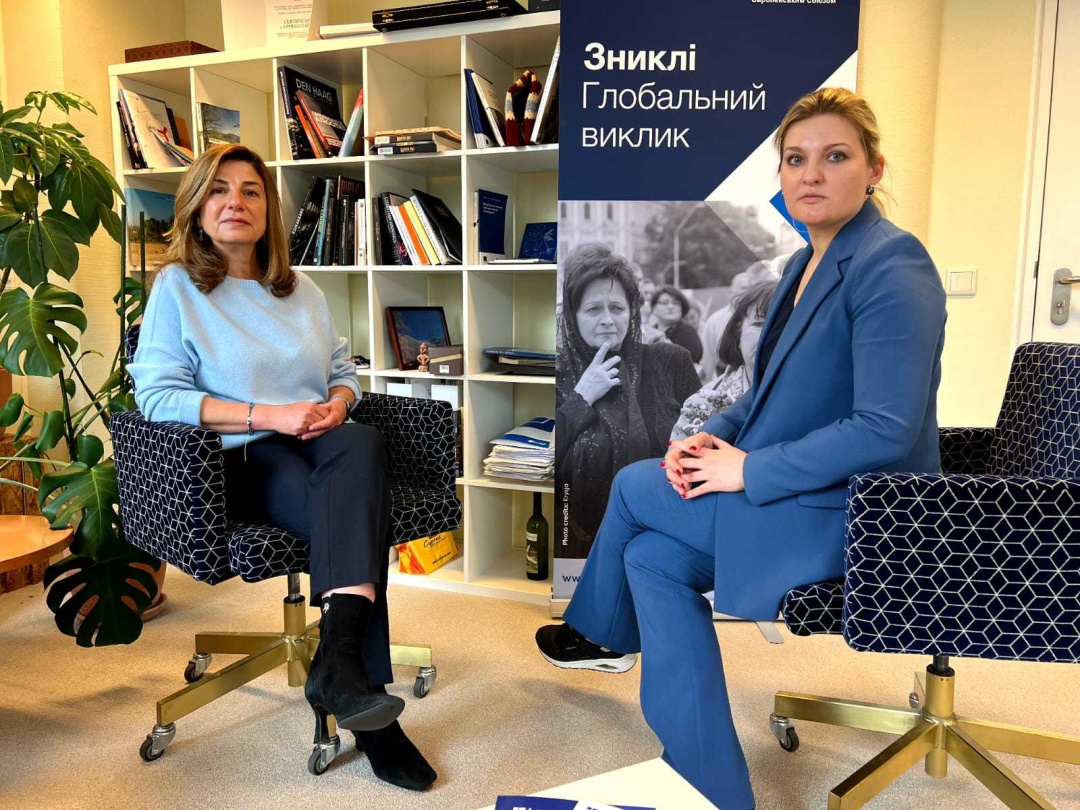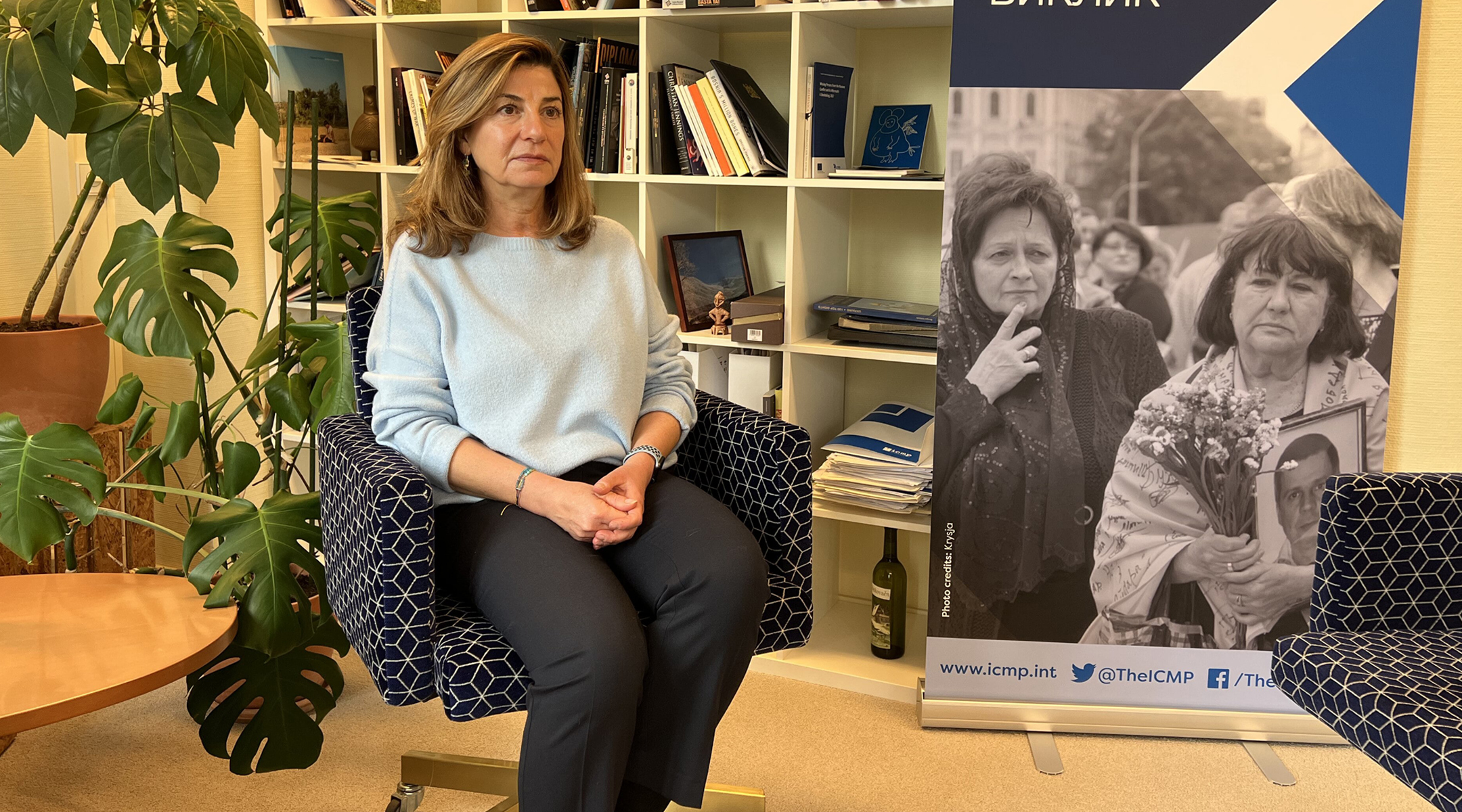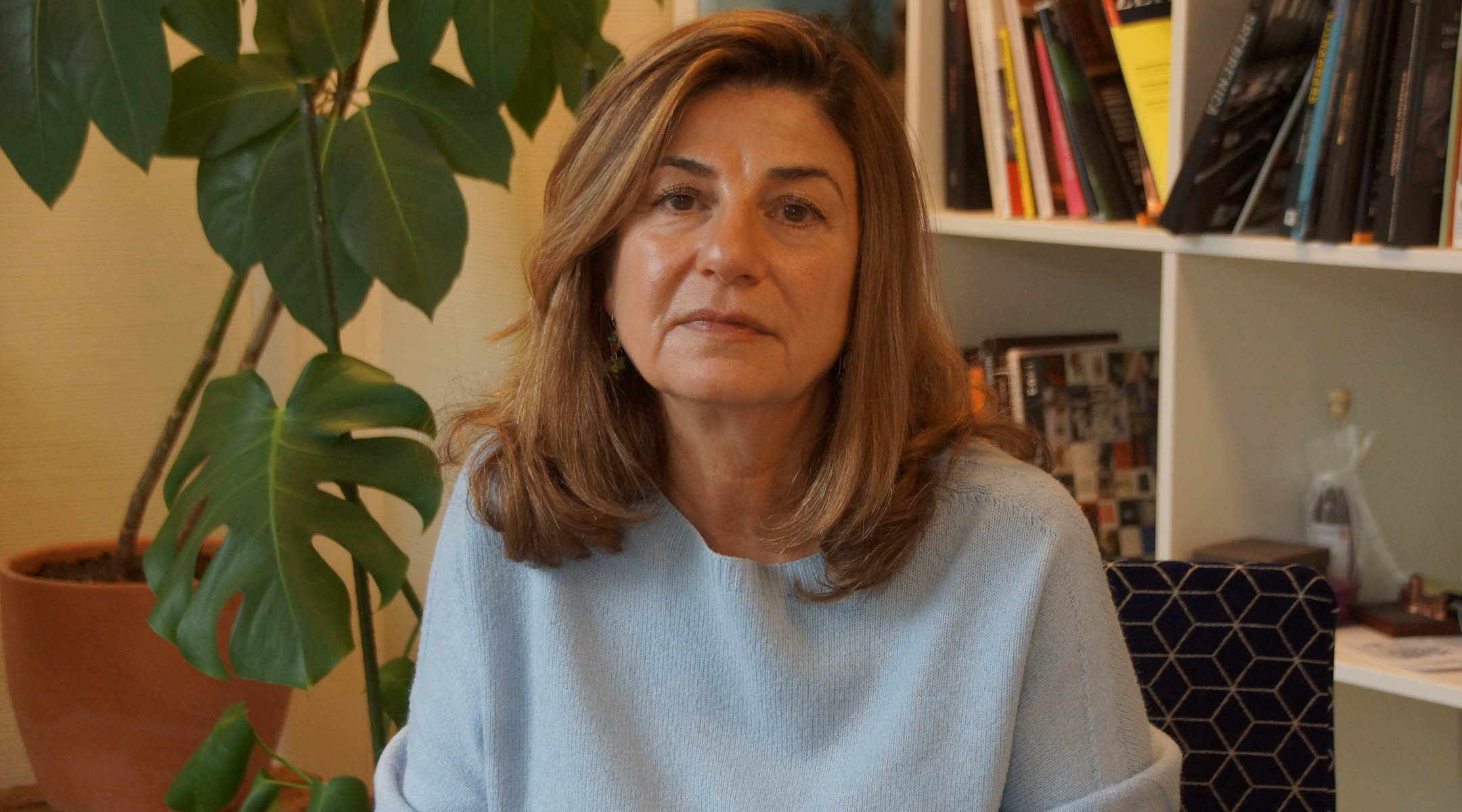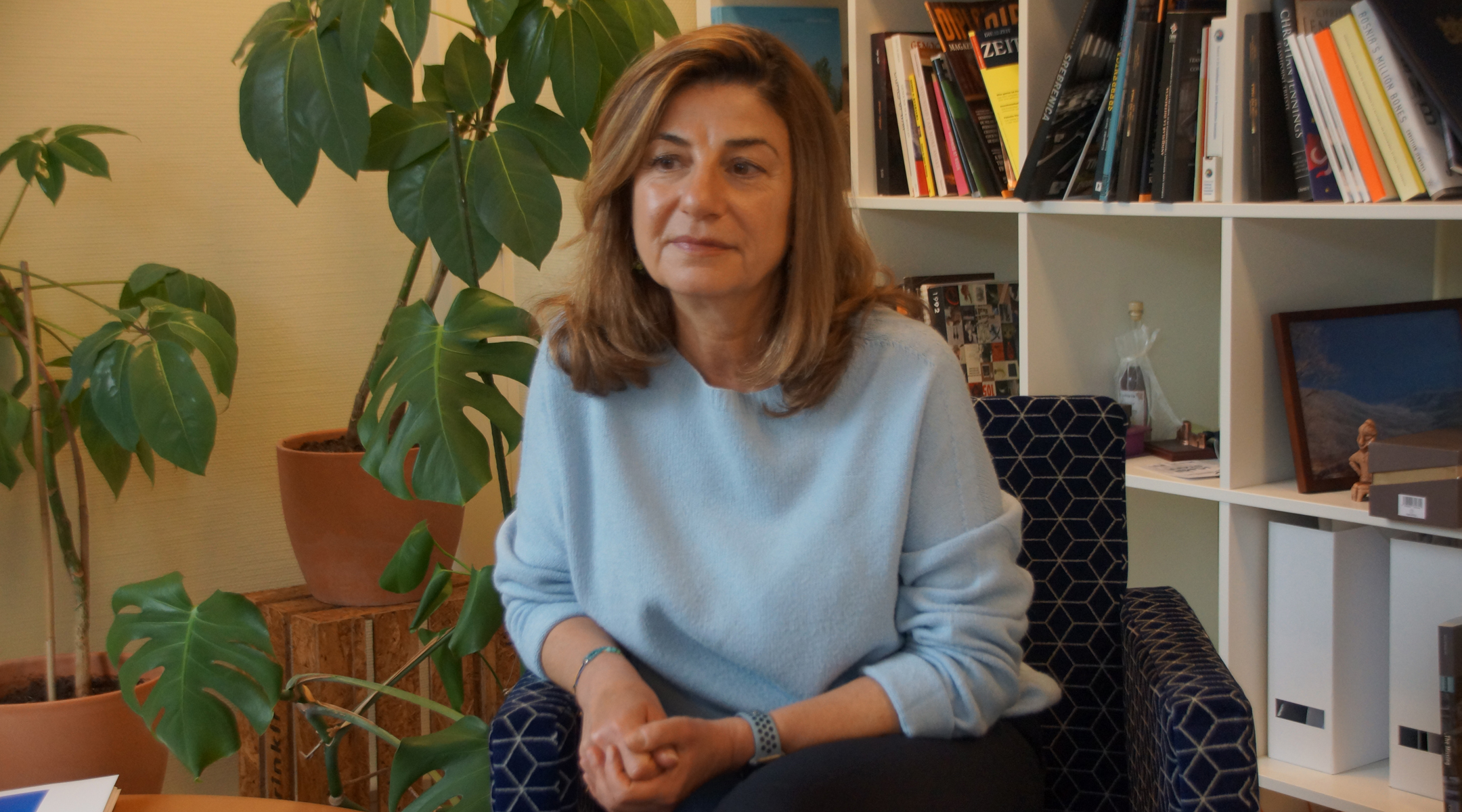The International Commission on Missing Persons (ICMP) is an intergovernmental organization based in The Hague, whose mandate is to ensure the cooperation of governments and others in locating missing persons from war, human rights abuses and other circumstances. As part of their work, ICMP supports efforts to help countries make identifications based on science. This is critical for Ukraine. The organization has a unique laboratory that focuses on human identification.
In particular, experts examine the DNA samples extracted from human remains, such as those found in mass grave sites, and compare them with the DNA obtained from mouth scrapings or blood samples from relatives of the missing. DNA samples between living relatives are also compared. This is important for families that have been separated, including forced deportations of children. Access to the laboratory in The Hague is restricted to authorized personnel only, who, in addition to wearing special protective clothing, must also submit their own DNA. These measures are taken to eliminate any risks and inaccuracies when working with the samples provided by relatives of the missing, as the main goal is to obtain the most accurate results possible. The laboratory's experts work on the most difficult cases, such as degraded bone samples.
Ukrinform managed to meet with a Ukrainian woman who is currently in the Netherlands because of russia's full-scale war in Ukraine. She is looking for a relative and donated her blood to the laboratory of the International Commission on Missing Persons (ICMP). The conversation took place in the format of an off-record meeting, as the woman is worried about her relatives, located in the temporarily occupied territory. She informed us that DNA testing was free of charge. At the moment the largest number of requests for help to locate relatives, that ICMP receives, is from Ukrainians. Ukrainian law enforcement officers also refer people to international experts in The Hague for DNA testing. The International Commission on Missing Persons does not disclose the number of these requests. It is important to note that the ICMP has an online inquiry center.
The organization's website explains step-by-step how to report a missing person, by providing detailed information, such as name, date of birth, and the place of disappearance. This can be done even in Ukrainian, as the organization works with translators. It is the only international organization tasked exclusively to work on the issue of missing persons.
Kathryne Bomberger, Director General of the International Commission on Missing Persons, told Ukrinform how the International Commission on Missing Persons helps Ukraine and how cooperation can be further strengthened in order to hold liable those responsible for the war crimes in Ukraine.

NO A SINGLE COUNTRY CAN ADDRESS SUCH A HIGH NUMBER OF MISSING PERSONS' CASES
- Russia's full-scale war in Ukraine began on February 24, 2022. However, I know that the International Commission on Missing Persons started working in Ukraine much earlier.
- Yes. We were initially invited by the general prosecutor in 2014, after the discovery of the first mass graves in Sloviansk. Since 2014, ICMP has been trying to secure funds to help Ukraine So we finally received support, but it happened sadly only after the invasion on February 24, 2022. I went to Ukraine on many occasions, but the last time I was in Ukraine was before the conflict in July 2021 to meet with a commission on missing persons and to establish a memorandum of understanding. I wish we had been there earlier, because now we have to set up everything from the beginning, when the war has already started. But it is what it is, and we’ll find a way.
- Your experts were also actively involved in the identification of the victims’ bodies of the downing of flight MH17 by the russians on July 17, 2014 in the sky over the Donbas. How was it organized? How long did the identification process of the bodies take?
- With MH17 we deployed a disaster victim identification team together with Interpol. And then later on we were involved in helping the government of the Netherlands conduct identifications of those who tragically lost their lives. Bear in mind, that to identify 298 victims, who were onboard, the Dutch authorities had been working heroically 24/7, but in the case of the war in Ukraine there is a much higher number of victims. No single country can address such a high number of these missing persons’ cases on its own.
- What should Ukraine do in this situation? Should it use large numbers of mobile laboratories? Should we join forces with international experts to jointly conduct the excavation of mass grave sites and apply DNA tests?
- I know that today in the world there are mobile laboratories that can go out, and we have also used them in the past and Ukraine has been using them. But, because the scale of the numbers of missing is very big, and the circumstances are complicated, we would advise against mobile laboratories. Because Ukraine would need thousands of mobile laboratories. So by cooperating with us Ukraine is also developing an infrastructure including augmenting its DNA capabilities to identify such a high number of missing persons. ICMP has a standing DNA laboratory capacity with over 2 decades of experience in doing only human identification. We help countries when there is abnormally a large number of missing persons cases, which there are in Ukraine. To use a DNA -led process of identifications is critical to investigating war crimes.

LAW ENFORCEMENT OFFICERS IN UKRAINE MUST CHANGE THE WAY THEY WORK
- When is the International Commission on Missing Persons planning to launch a massive program in Ukraine?
- We have not yet signed a cooperation agreement with Ukraine, but I hope to sign it as soon as possible. Currently, we’re having ongoing discussions with the government authorities in Ukraine. We’re also having ongoing meetings with families of the missing and with civil society organizations, so there are quite a number of partnerships and agreements, that need to be arranged and formalized before we start this whole process. So, we’re ready to go, we just need the formality, let’s say, of these agreements and partnerships to start a full-scale engagement. There is good will, which bodes well. It is also important that we operate as a credible and impartial international organization. Till today, we have worked on some cases, on a case-by-case basis, when Ukraine has asked for our help. But Ukraine has to change the way it’s operating, it has to go from a normal investigation into one case at a time to addressing thousands of cases at the same time. Because Ukraine changed on the 24th of February last year. Police is used to doing things the way they do, now they have to change the way they operate. We need to help Ukraine collect DNA from hundreds of thousands of families of the missing, so that you are able to quickly make an identification of someone found in a mass grave, or a child that has been separated from their family. And I think right now it’s essential that we work as partners with Ukraine and with the Ukrainian civil society and with the families of the missing.
- Your organization was involved in the Srebrenica massacre genocide case. Numerous examinations and the UN International Criminal Tribunal proved that it was a planned and deliberate massacre. How many people were you able to identify?
- We use DNA as a first line of identification. This was critical in identifying 7000 of the over 8000 Muslim men and boys executed in the Srebrenica Genocide of 1995 in Bosnia and Herzegovina. Their bodies were reburied in multiple mass grave sites after the war to cover up the crimes that were committed. We started using DNA to address this crime when no one else was using it on this scale to find large numbers of missing persons. Because the perpetrators removed the bodies of persons that were executed from one mass grave to another, in most cases the bodies were disarticulated across eastern Bosnia, with one man typically being found in 11 different locations 50 kill apart from each other. This is why we started using DNA. We eventually were able to identify these men and put many of the skeletal remains back together again. We also provided witness information through our forensics archaeologists and anthropologists, who were at the crime scenes. As an international organization, we were able to provide impartial evidence for criminal trials, that held war criminals to account. So, this will be critical also to Ukraine. But I think in today’s world we can probably do more, because DNA methods and data systems capabilities have evolved.

- Do you have a special program on how to communicate with families of the missing? How should archaeologists work during excavations of mass grave sites? How should they document evidence for the purpose of the trials?
- Yes, we do, so we have a massive learning and development program. Our program is named after the former prime minister of the Netherlands, who played a big role in ICMP’s history. It’s called the Wim Kok center of excellence and learning. And the center of learning will play a critical role in doing many things. First of all, working with families of the missing, who come from all walks of the society. Some of them are shopkeepers, farmers, some of them are lawyers, so making sure that they understand how the use of DNA works is important. Most of us know that we have a DNA, and that’s pretty much it. So, making sure that families of the missing have an expertise that will allow them to work on this issue together with the government, that’s critical. So, a lot of our colleagues are working on that. We’re also going to try to augment the capabilities, not only in the DNA testing, but also in forensics archaeology and anthropology. We have 2 Ukrainian colleagues that we’ve just brought on board, who are criminologists, who we also then train, who can then help in turn train the police or others, who are already at the sites, and train them to a level where the mass graves sites can be properly documented. So, you can see that each step of the way you need to ensure proper documentation, professionalism with law enforcement, with prosecutors’ offices that are dedicated to missing persons. Because there are so many crimes taking place, sexual violence, executions, Ukraine has to work on all these cases, so having an organization that can help Ukraine with addressing the issue of missing and disappeared persons can help alleviate the workload on Ukraine.
WORK ON FINDING MISSING PERSONS DURING CONFLICT IS HISTORICALLY UNPRECEDENTED
- Russia's full-scale war in Ukraine has been going on for two years now. How is it possible to work under these conditions, when the number of people killed and tortured is growing continuously?
- So working on active investigations of any kind including missing persons cases at this scale, while there is an active conflict, is historically unprecedented. The international criminal tribunal for former Yugoslavia was created in 1993, but it did not really start its investigations until after the Dayton Peace Agreement was signed. In 1996 it began a full-scale investigation into atrocities committed, including investigations into mass graves. So, the fact that in Ukraine these things are happening at the same time presents a new challenge for us, for Ukraine, our partners, families, civil society, and the whole world.

- You have been appointed as Head of the International Commission on Missing Persons since 2004, but you also used to work as a journalist. Why did you decide to retrain?
- A very long time ago, when I was your age, I had wanted to become a journalist. Thank you for remembering that. I am fond of it, I am big believer in transparency, reporting, and I’m thanking you really for the reportage that you’re doing, because this is very important. Then I had a skiing accident, went on to do other things and studied international relations and politics and eventually worked for the United States Senate and ended up working at ICMP - it’s a long story. But I really love the work that I do, I feel very passionate about it, I feel very lucky that I can do a job like this, that I can be a part of organization, that is really structured to be able to assist families of the missing and governments like Ukraine in the desperate times of need. I think we have developed together as a team organization a specialization that is very needed today in the world, sadly, given the growing number of missing persons. And when talking about Ukraine, I am optimistic that we can help, because have a lot of experience. Particularly, we started our work in the context of former Yugoslavia. In Europe there was also a war, that ravaged that part of the world during the 90s, where very large numbers of persons were missing, 40 thousand across the region. And we were able to help the countries in that region account for almost 75% of the 40 thousand people who went missing. And almost 90% of those missing from a Srebrenica genocide of 1995. So, we learned a lot, and we want to help Ukraine so that Ukraine does not repeat some of the mistakes that were made in that region. As we were learning in that region, we were learning with the families there. A great deal, which we need to help Ukraine with, is to apply these lessons learned, and we’re prepared to do that.
- Could you tell us how the International Commission on Missing Persons is funded?
- So, ICMP became a treaty-based international organization in 2014. So we grew from the initial geographic, temporal limitations of our mandate in the former Yugoslavia, because the world I think understood that the missing person issues are not just allocated to that part of the world. In fact, it’s a global challenge, it’s a global problem, and it’s one that sadly is growing. So, we became a treaty-based international organization, and that took 12 years. We have a number of states now that have acceded to the treaty; however, we remain voluntarily funded and this sometimes poses challenges. And I just want to give you one example. Initially, we were invited by the prosecutor's office to Ukraine in 2014 after the discovery of the mass graves in Sloviansk. I regret to say we were unable to, despite real constant efforts over the years, to secure funding until after the invasion happened. The fact that we were not there was just a limitation in terms of donors wanting to support the ICMP’s work there. So, I keep thinking, what if we had been there before, we would have set the system before, and would have gathered data already, starting with the DNA, and would have helped Ukraine build data systems, but we are, where we are now. So, we have to do what we can at this moment and move now, as time does not stand still.
TO PROVIDE EVIDENCE TO ICC, IT IS NECESSARY TO ENSURE A PROPER EXAMINATION FOR EVERY SINGLE MASS GRAVE SITE
- Can your organization identify large numbers of missing persons?
- We do many things, but part of our program includes maintaining a high throughput, meaning maintaining a large capacity human identification laboratory. So, this laboratory is unique. And again, this could be used for reuniting families or making identifications of persons who were illegally adopted, or persons who were executed, etc. So that is the focus of the DNA lab of ICMP. So, the laboratory is unlike, let’s say, the laboratories in Ukraine, that are doing multiple things of which identifying victims is one thing, but doing other crime scene investigations are other components. Thus, we established this laboratory to help governments that are in the situation, Ukraine is in, when you have such a high number of missing persons, you need to create a system, whereby there is a focus on a missing person’s process that can be integrated into the overall criminal investigation. We need to move. The reason that’s important is because gathering the skeleton remains in many cases will be challenging. The bodies might have been burned, chemically treated, so we are able to focus on this component only. That is a specialization that ICMP has, where we’ve gained a lot of experience, and we probably profile more samples from skeleton remains than any other lab in the world. So, this is a particular specialty. The laboratory has the capacity to do thousands of cases at the moment, with the staff to work only on human identifications.
- Do your experts work directly in Ukraine?
- I have colleagues that either work directly with the families of the missing to build their advocacy skills, to build their knowledge about how the process of excavation works, how the DNA identification process works. There are also other colleagues that are directly in the field, who are forensics anthropologists, archaeologists, criminologists, they will work with the designated authority, either the general prosecutor’s office, the SBU or the ministry of interior and the national police to conduct excavation to the level where evidence can be collected and put into the laboratory system and where the international standards would apply, so that evidence can be provided to an international court, such as the ICC. And to be able to keep up with the challenge of ensuring that each case at every single mass grave site has a proper examination, so that the cause and the manner of death can be determined.
- Do you cooperate with the Office of the Prosecutor of ICC?
- We have cooperation agreements with all of the courts here in The Hague including the ICC and we signed the cooperation agreement with the office of the prosecutor in 2016. That relationship in my mind would be very similar to the relationship we had, and we continue to have with the international criminal tribunal for the former Yugoslavia, where we provided evidence in over 30 high profile criminal trials including the Karadžić and Mladić cases, where we were, I think, instrumental in helping the courts reach a verdict of genocide, in the case for example of Srebrenica. We are ready to work with all courts, whether it’s courts in Ukraine, whether it’s the ICC, whether it’s a specialized tribunal, or whether it’s courts operating under the universal jurisdiction. The main purpose is to achieve justice.
Iryna Drabok, The Hague
Photos by the author
